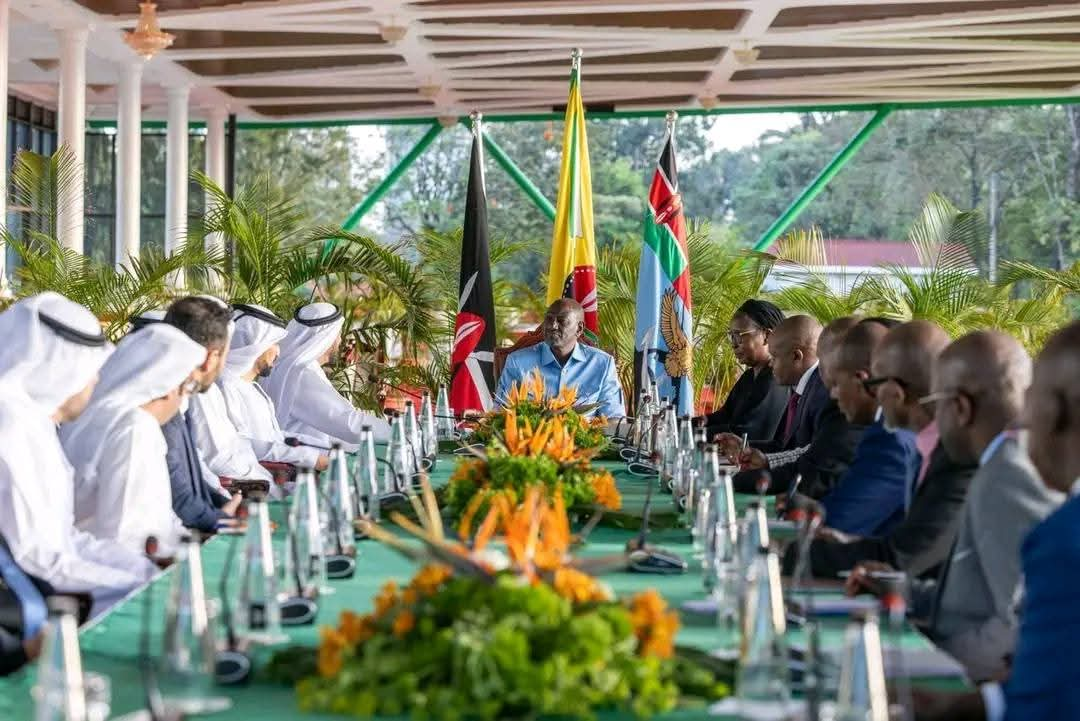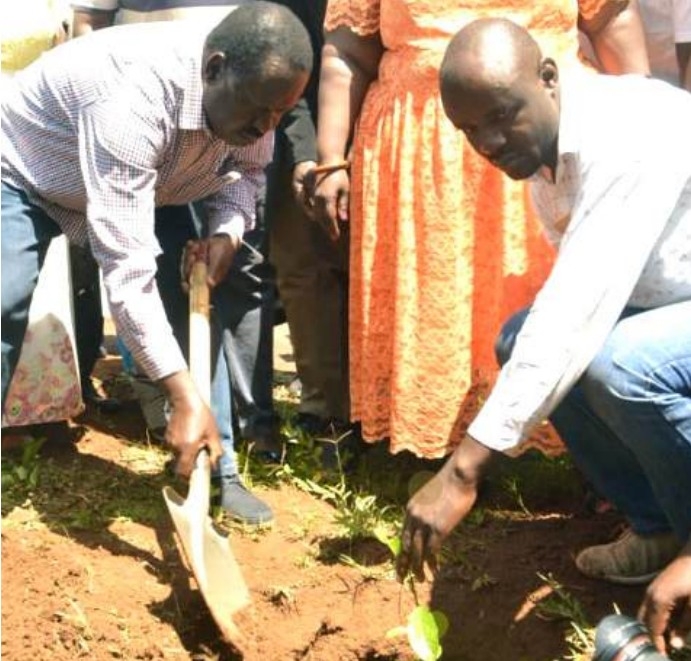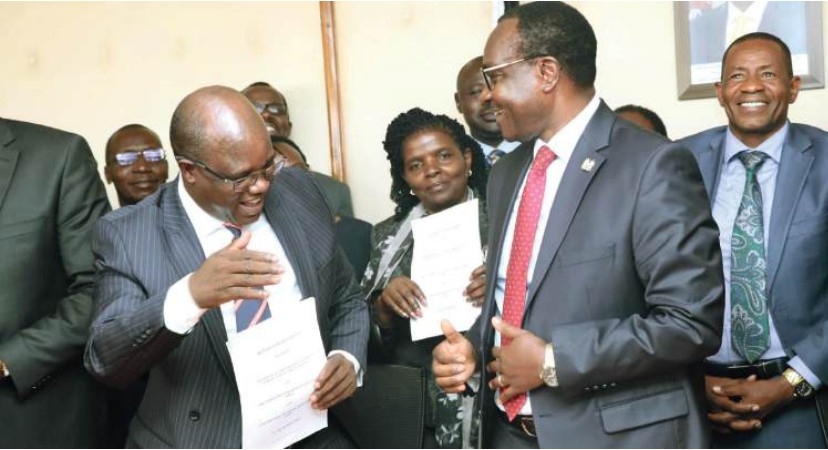
 President William Ruto hosts a delegation from Sharjah, UAE, led by Abdulla Sultan Al Owais, Chairman of the Sharjah Chamber of Commerce & Industry at State House Nairobi on Nocember 11, 2025
President William Ruto hosts a delegation from Sharjah, UAE, led by Abdulla Sultan Al Owais, Chairman of the Sharjah Chamber of Commerce & Industry at State House Nairobi on Nocember 11, 2025President William Ruto has intensified his diplomatic outreach, courting geopolitical rivals across the world in what his government frames as an effort to “advance Kenya’s development priorities”.
His latest engagements were in the Gulf, where in a single
week, he held high-level meetings in both Qatar and with the United Arab Emirates,
two regional heavyweights whose relations have long been defined by
competition, strategic rivalry and contrasting foreign policy visions.
Ruto’s simultaneous courtship of Doha and Abu Dhabi comes at
a time when Washington is increasingly uneasy about Kenya’s deepening ties with
China, the world’s second-largest economic power.
Analysts say the President is deliberately widening Kenya’s
diplomatic bandwidth, engaging partners across rival blocs to diversify
economic options and maximise strategic leverage.
Qatar and the UAE, despite close geographic proximity and
shared cultural roots, have for years navigated a complex relationship shaped
by political divergences and competing regional ambitions.
By strengthening ties with both, Kenya is inserting itself
into the subtle geopolitics of a region where alliances shift rapidly and
rivalries often play out through investment, security cooperation and
influence-building.
On Monday, Ruto hosted a delegation from Sharjah in the UAE
to “advance discussions” on expanding trade and investment between the two
sides.
The President reaffirmed that Kenya is committed to
deepening its relationship with the UAE through stronger trade, investment and
economic cooperation under the Comprehensive Economic Partnership Agreement
(CEPA) signed in January.
“Our talks focused on deepening investment partnerships in
infrastructure and energy,” Ruto said.
He cited projects to expand Kenya’s energy generation
capacity to 10,000 megawatts in the next seven years, dual 1,500km of highways
and build 10,000km of tarmac roads.
There are also plans
to expand ports and airports and develop 50 mega dams through public-private
partnerships to boost irrigation and food security.
“We are also strengthening collaboration in the ICT, digital
and creative sectors, leveraging Kenya’s tech-savvy youth, whose innovation
continues to drive the nation’s digital transformation,” the President said.
Notably, the meeting came just a week after Ruto’s visit to Doha, where he held high-level diplomatic meetings.
The President met Sheikh Tamim bin Hamad Al Thani, the Emir
of Qatar, and agreed to expand the Gulf state’s investment footprint in Kenya.
“Qatar’s support for our mega-dam programme will be central
to enhancing food security and bringing nearly two million acres under
irrigation,” Ruto said.
“We are also strengthening cooperation through the upcoming
establishment of Kenya’s Sovereign Wealth Fund and National Infrastructure
Fund, which will mobilise capital for transformative national projects.
“In aviation, we reaffirmed the newly signed Kenya
Airways-Qatar Airways partnership to enhance connectivity, trade and tourism.”
Beyond economic collaboration, the two leaders resolved to
intensify joint efforts to promote peace and stability in the Eastern Africa
region, including supporting diplomatic initiatives in Sudan and the DRC.
By engaging the two regional powers with competing global
and ideological alignments, Nairobi finds itself delicately balancing between
two influential partners who sit on opposite ends of the Gulf political axis.
Further, Doha and Abu Dhabi’s broader global alignments often contrast sharply.
For instance, alongside Saudi Arabia, UAE was part of the bloc that imposed a diplomatic and economic blockade on Qatar from 2017 to 2021, accusing it of supporting terrorism and interfering in their affairs.
During the period, Qatar forged security relations with
Turkey and, to a lesser extent, Iran to balance the threat that Saudi Arabia
and the UAE posed.
It also sought to reinforce its economic and political
sovereignty.
In the region, while Sudan has accused the UAE and Kenya of
supporting and facilitating the Rapid Support Forces, Qatar has widely been
seen as backing the Sudan Armed Forces.
The Doha visit came barely six months after the UAE sealed
its own strategic gains in Nairobi. In May 2025 , Kenya and the UAE signed
seven bilateral agreements after the CEPA deal in January.
The deals witnessed by President Ruto and UAE deputy PM and
Foreign Minister Sheikh Abdullah bin Zayed Al Nahyan covered cooperation in
military affairs, energy, transport, customs and renewable energy.
The UAE’s involvement in wind, solar and geothermal
projects, along with planned investments in railway and port infrastructure,
have placed it in a strong position to shape Kenya’s green transition and
logistics development.
The military cooperation deal also hints at expanding the
UAE’s influence along the Indian Ocean corridor and in the Horn of Africa.
“What is happening is that these powers are doing everything
possible to have strategic relations with Kenya as an entry point to the
region,” a Horn of Africa analyst who did not want to be named said.
“For instance, UAE and Qatar would like to use Kenya as the
entry point into Somalia ahead of the 2026 elections.”
He noted that Kenya is seen as the most strategic partner in
the region, particularly with its EAC chairmanship and close ties with Ethiopia
and other Igad members.
“On the UAE meetings, while trade is coming out as the main
issue for the cameras, I want to believe conversations on RSF are also
happening,” he added.
“UAE and Saudi Arabia have also for long wanted to manage
the port of Kismayo, and Kenya offers a good entry point.”
Qatar’s renewed engagement, therefore, comes as a
counterweight to what some in Nairobi’s diplomatic circles describe as Abu
Dhabi’s assertive entry.
Despite these tensions, the Kenya Kwanza administration
insists its foreign policy remains non-aligned but pragmatic.
In its manifesto, Kenya Kwanza indicated it would not only
deepen bonds with long-standing international and bilateral partners, such as
the US, the UK, the EU, China and India, but also extend friendship to “anyone
with whom we believe a mutually beneficial relationship can be formed”.
The balancing is further complicated by Kenya’s role as a
diplomatic and logistical hub for the Horn of Africa — a region where Gulf
rivalries often spill over into politics, security and investment.
It, however, doesn’t stop with the Gulf states.
Nairobi has found itself in a tough corner as it seeks to
balance relations with China and the US.
US Senator Jim Risch moved to review Kenya’s non-NATO ally
status over its close relations with the US and China, as well as with Iran.
During his trip to China in April, Ruto in a speech at
Peking University said Kenya and China are "co-architects of a new world
order".
The statement, in which he referred to the two states’
shared vision for a new global peace and security architecture and equal
representation for all continents, triggered concerns in Washington.
At the same time, Ruto's move to host Iran President Ebrahim
Raisi (now deceased) in 2023 also caused discomfort among Kenya’s Western
allies, who saw it as a tilt toward Tehran.



















